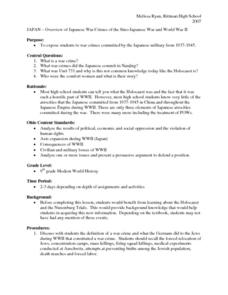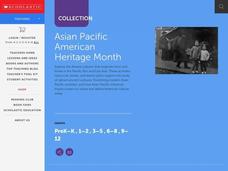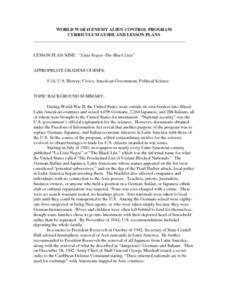Curated OER
Overview of Japanese War Crimes of the Sino-japanese War And World War Ii
Ninth graders discuss the definition of a war crime and what the Germans did to the Jews during WWII that constituted a war crime. The analyze the results of political, economic, and social oppression and the violation of human rights.
Curated OER
Do We Need a Permanenet International Criminal Court?: War Crimes, Violence, International Law and Politics, Nuremberg
For this lesson, students explore the history, relevance and current application of international tribunals for war crimes. Students look at cases from the Nuremberg trials, Tokyo trials and the Bosnian War.
Curated OER
Letters from the Japanese American Internment
Young scholars explore the concept of Japanese internment. In this Japanese internment activity, students examine primary sources that enable them to discover what internment camp life was like and its implications, Young scholars...
Curated OER
Japanese American Baseball in the Camps
Students study Japanese American internment camps. In this American history lesson, students compare and contrast the camp internees' experiences with with team sports-related challenges students have encountered. Students discuss team...
Curated OER
An Issue of Loyalty: Exploring the Treatment of Japanese Americans During World War II
Students consider the meaning of loyalty. They explore the history of Japanese in the United States. and consider the meaning of citizenship. They create a presentation for the class. It can be a poster, Power Point or other...
Digital History
Compensation for Slavery
Should Americans provide compensation to those whose ancestors suffered from slavery? Read and analyze the arguments of two modern-day journalists on the topic. Then, have a discussion on both the merits of the arguments as well as what...
Curated OER
H4 Homework Assignment #22-23
For this global studies worksheet, learners read the noted pages in their textbooks and then respond to 8 short answer questions about Japanese involvement in World War II.
Curated OER
Wartime and the Bill of Rights: The Korematsu Case
Twelfth graders work together in groups to examine the discrimation Japanese Americans felt after the bombing of Pearl Harbor. Using primary source documents, they analyze and discuss the case of Fred Korematsu who was placed in an...
Curated OER
The Real World War II
Pupils work in groups in order to investigate primary and secondary resources in order to make their own conclusions about the history of World War II. They look at the evidence critically looking to find valid resources.
Curated OER
Land of the Rising Guns?
Students discuss the decision after World War II of Japan's to follow a policy of pacifism. After reading an article, they identify the ways Japan is strengthening its military. They watch a video to discover how their Constitution was...
Curated OER
Letters from the Japanese American Internment
Students make deductions about life in an internment camp by reading and comparing letters written to Clara Breed. Along the way, they consider the advantages of looking at a historical event from the multiple points of view of...
Curated OER
"Lista Negra-The Black Lists"
Students review the history and political motivation behind the U.S. adoption of the Monroe Doctrine and how national security measures collide with the issues of due process and human rights during times of war. They learn about how the...
National First Ladies' Library
Impeachment!
Young scholars investigate the impeachment proceedings against Andrew Johnson, Richard Nixon, and William Clinton. In small groups they conduct Internet research on one of the three Presidents, and present a "brief" on the case,...
Curated OER
ESL Adverbs of Degree and Reason- Likes and Habits
In this ESL adverbs of degree and reason worksheet, students answer questions about books and films they like using the given format. They tell how much they like them by using comparisons. They describe the games and hobbies, and sort...
PBS
Pbs: Tolerance in Times of Trial
This lesson compares the treatment of Japanese-Americans and German-Americans during World War II and the treatment of Arab-Americans after September 11th.
















